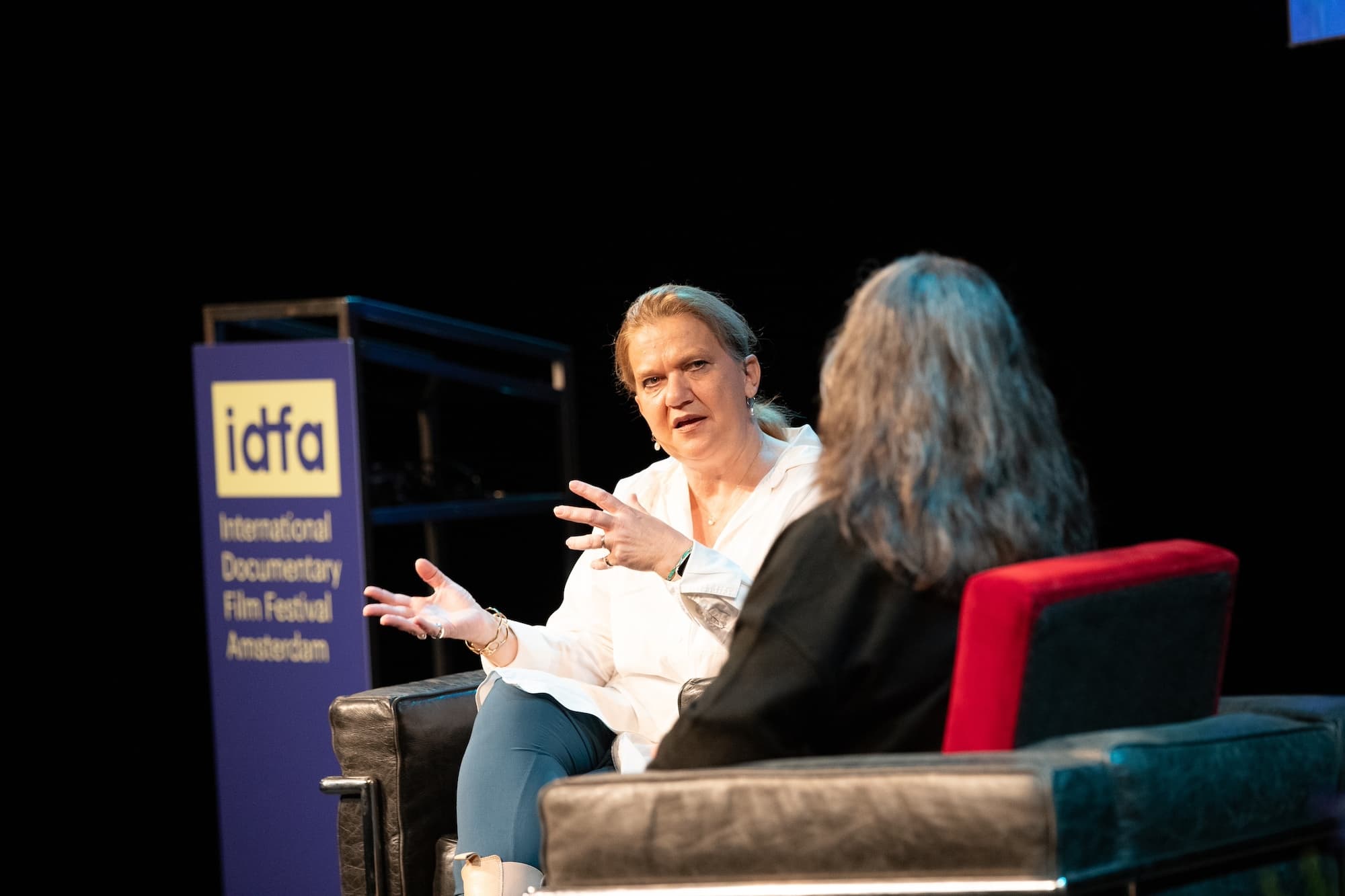
Ada Solomon on integrity, artistic drive and respecting your protagonists
One of Romania's most prominent producers who has been working in fiction and documentary and everywhere in between was the guest of the Filmmaker Talk moderated by Pamela Cohn.
Solomon was on the jury for the International Competition at IDFA, while her latest documentary, Arsenie. An Amazing Afterlife, screened in Signed section. It was directed by her life partner, Alexandru Solomon, and looks at the phenomenon of an immensely popular figure of a monk whom the Romanian Orthodox Church is considering canonizing.
"Our main interest was why the Romanian society needs miracles, why people need to rely on spirits," Solomon explained. "The presence of the church in Romanian society is extremely vivid. It's used politically by the authorities, and the church as an institution is not itself innocent in all this. So basically, the film is a panorama of Romanian society today, with all the pain and the questioning."
The film shows believers who, led by the director, go on a pilgrimage to this monk's home village. There is an obvious divide between the director and producer's values and those of the pilgrims, but Solomon said that respect for protagonists is her key credo in documentary cinema.
"If you don't completely respect and trust your partner and your characters, then what you do won't translate from the screen to the audience," she said. "And the protagonists will not open up if they don't receive this kind of trust and respect from the filmmakers. I think that this is something absolutely relevant for the crazy world we are living in today, where we hear ultimate statements and are less and less open to a conversation, to listen to the other."
The team went around Romania organizing screenings of the film, and often ran into resistance about this figure and topic that are clearly sensitive for Romanian viewers.
"We always wanted to listen to the arguments that were against the film, but face to face. The amount of hate and violence that we got in the comments on social media was incredible, especially from people that haven't seen the film. This kind of deafness while screaming to overpower the voice of the other is something that we are trying to fight with our only available weapon: filmmaking."
It's the storyteller who matters
Another film that deals with a controversial Romanian figure is The Distance Between Me and Me by Dana Bunescu and Mona Nicoară. It is a 2018 documentary about Nina Cassian, Romanian Jewish avant-garde poet, musician, and visual artist who was at odds with all the governments from 1940s fascist one to being exiled to New York by the Ceaușescu regime in 1985.
"I'm so very grateful to the director for coming along on this journey, because I have been admiring Nina Cassian since my childhood. Her poems, and the approach to femininity are something very special that stayed with and healed me in my adolescence," Solomon recalled.
Cassian was the best friend of Solomon's mother-in-law, so her husband was too close to the subject to make the film.
"I really wanted to make this film and I had this idea to work with Mona because she was also someone who wrote poetry, grew up in Romania, and then emigrated, living in between the US and Romania spiritually. She was a perfect match to understand the complexity of a character like Nina Cassian."
When Cohn asked Solomon how she picks her projects, the producer homed in on the filmmaker’s motivation and the importance of who the storyteller is.
"The first question for a filmmaker is why—why do you want to do this? Why do you want to spend five or ten years of your life on this story and give it to the world? A script or a setting can be worked out, but if you don't have the drive, this inner flame, it's impossible to do anything worthwhile. I think that it's not a story that is important, I think the storyteller is the one who matters."
Solomon said she is the worst liar in the world, and she can't package and sell something she doesn't believe in. This requires that the director shares her values.
"I want to work on things that are interesting and relevant, that give me more knowledge and more understanding. I do it for myself as well; that's how I work," she spoke candidly.
In the case of The Distance Between Me and Me, Solomon believes it was a way to tell a wider, historic story through an intimate approach.
"It's a part of history as it's seen from inside by someone that lived it in many crucial moments. As seen as a Jew, as an opponent to the Communist Party, as a dissident, as an exile in the end, and also a very Romanian person. Such a story and such an approach allow you to learn much more than what you get from dry lines in a history book," she explained.
Trusting the filmmaker and looking after protagonists
Another film that tells of uncomfortable Romanian history in a creative way is Radu Jude's Uppercase Print. Jude is the director she has worked with the most, both on fiction and documentaries and all the in-between forms that the Romanian auteur is famous for. This particular film is a cinematized version of a documentary play by Gianina Cărbunariu, who based her text on secret police Securitate's records of a case of a young boy who drew graffiti demanding freedom in 1981.
"I was really very excited by this mix of media because it's archived material, plus this very theatrical representation. I thought that it's a very powerful tool to understand how the whole system and the surveillance system was working," she explained. "It's not fiction, it's not a documentary, but it is a testimony, a document about these times. And I think it would work very well in schools to explain what life was like for a teenager living under communism. But the audio-visual is very little present in our education system, but that's another uphill battle."
Continuing on Jude, Solomon said: "The cinema I am devoted to and actually the only one that I think I can handle is the auteur cinema in the very classical meaning of the word. And Radu is exactly that kind of filmmaker, whom I completely trust and from whom I learned a lot. My role is to back his vision and find solutions for his absolutely magnificent capacity to bring stories to the screen in such diverse types of storytelling.
"He always knows exactly why he approaches a certain topic in a certain way, why it needs to be black and white or why it has to be filmed on celluloid. Even if sometimes it might look rough, or kind of amateurish, it's for a reason. It's not because he doesn't know how to do it otherwise, it's because he wanted to say something precisely with that approach."
Her approach is similar with filmmakers from other countries, for example, with German director Maren Ade with whom she worked on Toni Erdmann.
"Maren was very dedicated to have a very realistic representation of the Romanian society and its relationship with the corporate world. Also, even when I'm just providing services for international productions, I'm not touching projects that that are damaging to my values or to my view of my country or any other subject," she elaborated.
"But I never infringe on the vision of my director, even when maybe I'm not agreeing completely. I think that my role is to find creative solutions to sustain their vision, not to change it or their story."
A director Solomon trusts completely is Ivana Mladenović, whose Soldiers: Story from Ferentari is another example of mixed genres, a film based on the autobiographical book of a man who plays a version of himself in it.
"I was fascinated by the book because it's a very interesting setup for this film. In fact, it's the real experience of Adi [Adrian Schiop] with his relationship with a Roma man that was re-transformed by Ivana in her script. That was a big challenge, and it touches upon direct cinema and the documentary world, because it was dealing with emotions and sensitivity and a very intimate relation between the characters.
"Secondly, the Roma guy, Vasile Palev, is not a professional actor, plus he is not gay. But he played an amazing role and it was a life changer for him. He started acting in more films, but now he's in jail, for a stupid minor thing. But we are looking after him, not to lose him after this experience.”
Solomon reflects on the responsibility of the film community at large: “I think that this is also our duty, when we bring in non-professionals, we have to look after them."
